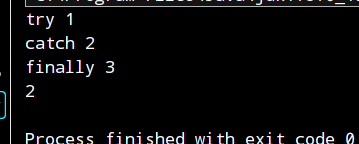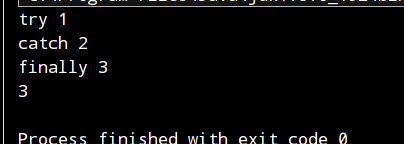没有return
try无异常
public class TestReturn {
private static void test() {
try {
System.out.println("try");
}catch (Exception e) {
System.out.println("catch");
} finally {
System.out.println("finally");
}
}
public static void main(String[] args) {
test();
}
}

try有异常
- try、catch、finally的代码块是顺序执行
public class TestReturn {
private static void test() {
try {
System.out.println("try");
int a = 2 / 0;
}catch (Exception e) {
System.out.println("catch");
} finally {
System.out.println("finally");
}
}
public static void main(String[] args) {
test();
}
}

有return
try有return
- 因为当try中带有return时,会先执行return前的代码,然后暂时保存需要return的信息,再执行finally或者catch中的代码,最后再通过return返回之前保存的信息。所以,这里方法返回的值是try中计算后的1,而非finally或者catch中计算后的2或3。
public class TestReturn {
private static int test() {
int num = 0;
try {
num++;
System.out.println("try"+ " " + num);
return num;
}catch (Exception e) {
num++;
System.out.println("catch"+ " " + num);
} finally {
num++;
System.out.println("finally"+ " " + num);
}
return num;
}
public static void main(String[] args) {
System.out.println(test());
}
}

- ==但是必须要注意的是上面例子只是对于基本数据类型 如果是引用类型 存的不是变量本身,而是变量的地址,所以当finally或者catch通过地址改变了变量,还是会影响方法返回值的。
private static List<Integer> test2() {
List<Integer> list = new ArrayList<>();
try {
list.add(1);
System.out.println("try:" + list);
return list;
} catch (Exception e) {
list.add(2);
System.out.println("catch:" + list);
} finally {
list.add(3);
System.out.println("finally:" + list);
}
return list;
}

catch有return
- catch中带return还有俩种情况 如果try中是有异常的 那么catch中return与try中一样,会先执行try的return前的代码,然后触发异常 忽略try中的return语句, 然后执行catch代码块中的代码 再执行catch中的return保存当前 i 的值,再执行finally中的代码,最后再通过return返回之前保存的信息。所以,这里方法返回的值是try、catch中累积计算后的2,而非finally中计算后的3。
public class TestReturn {
private static int test() {
int num = 0;
try {
num++;
System.out.println("try"+ " " + num);
int a = 2 / 0;
return num;
}catch (Exception e) {
num++;
System.out.println("catch"+ " " + num);
return num;
} finally {
num++;
System.out.println("finally"+ " " + num);
}
}
public static void main(String[] args) {
System.out.println(test());
}
}

finally有return
- 当finally中有return的时候,try和catch中的return会失效,在执行完finally的return之后,就不会再执行try中的return。这种写法,编译是可以编译通过的,但是编译器会给予警告,所以不推荐在finally中写return,这会破坏程序的完整性,而且一旦finally里出现异常,会导致catch中的异常被覆盖。
public class TestReturn {
private static int test() {
int num = 0;
try {
num++;
System.out.println("try"+ " " + num);
int a = 2 / 0;
return num;
}catch (Exception e) {
num++;
System.out.println("catch"+ " " + num);
return num;
} finally {
num++;
System.out.println("finally"+ " " + num);
return num;
}
}
public static void main(String[] args) {
System.out.println(test());
}
}

总结
- finally代码块总是会执行
- 如果是基本数据类型并且finally或者catch中没有return 即使catch或者finally对其数据进行修改 也不会对返回的数据有影响 但是如果是引用类型就会对返回的数据有影响
- finally中有return时,会直接在finally中退出,导致try、catch中的return失效。





